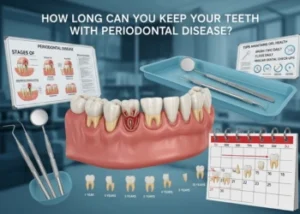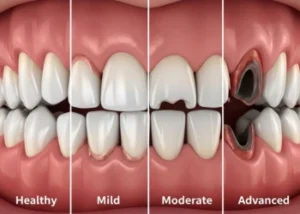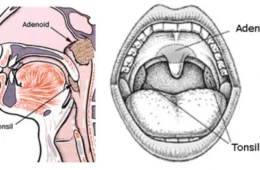
How Long Can You Keep Your Teeth with Periodontal Disease?
We know how worrying it feels to hear about periodontal disease—it’s a common concern that affects millions. But here’s the good news: with early action and consistent care, you can often keep your natural teeth for a lifetime. At EliteFixDenture.com in Chicago, we see patients every day who turn things around. Let’s break it down step by step so you feel empowered.
Understanding Periodontal Disease
Periodontal disease, often called gum disease, starts quietly but can lead to serious issues if ignored. It begins with plaque buildup from bacteria in your mouth. Without daily brushing and flossing, this plaque hardens into tartar, irritating your gums.
You brush away plaque easily, but tartar needs professional help. In Chicago’s dry winter air—think Lakeview’s chilly winds—staying hydrated helps keep your mouth moist and gums resilient. Dryness worsens inflammation, so sip water often during those cold months.
Stages of Periodontal Disease
Periodontal disease unfolds in stages, each more challenging than the last. Here’s a quick overview in a table for clarity:
| Stage | Description | Reversibility | Key Signs |
| Gingivitis | Mild gum inflammation from plaque. Gums redden and bleed easily. | Fully reversible | Bleeding during brushing |
| Mild Periodontitis | Bacteria invade below gums, forming pockets. Slight bone loss begins. | Manageable, not fully reversible | Receding gums, bad breath |
| Moderate Periodontitis | Deeper pockets, more bone and tissue loss. Teeth may feel loose. | Slowed with treatment | Pain, pus around teeth |
| Advanced Periodontitis | Severe bone destruction. Teeth loosen significantly. | Irreversible damage; focus on preservation | Tooth mobility, chewing pain |
Progression varies—some notice changes in months, others over years. Early stages often sneak up without pain. Nearly 42% of U.S. adults over 30 have some form of it, rising to 60% by age 65.
The Risk of Tooth Loss from Untreated Gum Disease
Untreated periodontal disease erodes the bone and tissues that anchor your teeth. This leads to loosening and eventual loss—it’s the top cause of adult tooth loss in America. Imagine enjoying a Lincoln Park stroll without wincing from gum sensitivity; ignoring the signs steals that comfort.
Without intervention, advanced stages can claim teeth in 12-16 months for some, but timelines differ based on health, smoking, and diabetes. The key? Act before bone loss sets in irreversibly.
How Long Can You Preserve Your Natural Teeth?
You can keep your teeth with periodontal disease for decades—or even a lifetime—with prompt treatment and maintenance. Early detection reverses gingivitis completely, while periodontitis slows dramatically under care.
Studies show regular checkups every 3-6 months post-treatment slash recurrence risks. Patients who quit smoking and manage blood sugar preserve teeth longer. In our Chicago practice, we guide you every step, just like Dr. Aziz Liaquat does for patients facing extractions or implants—he specializes in saving smiles through implant dentistry.
For more on stages and risks, check the American Dental Association’s guide.
Proven Treatments to Protect Your Teeth
You don’t have to lose teeth to gum disease—treatments halt progression effectively. Start with nonsurgical options like scaling and root planing, which scrape away tartar deep below the gums.
If needed, surgery reshapes gums or grafts bone to rebuild support. Antibiotics target stubborn bacteria, and laser therapy offers gentler healing.
Here’s a bullet list of daily habits that boost treatment success:
- Brush twice daily for two minutes with a soft toothbrush—electric ones remove more plaque.
- Floss once a day to clear between teeth.
- Rinse with an antibacterial mouthwash to fight bacteria.
- Quit smoking; it doubles your risk.
- Visit your dentist every 6 months, or more if at risk.
These steps, combined with pro cleanings, keep pockets shallow and teeth stable. See the CDC’s gum disease facts for stats that motivate.

FAQs: Your Periodontal Disease Questions Answered
Q: How Long Can You Keep Your Teeth with Periodontal Disease?
A: You can keep your teeth for a lifetime with periodontal disease if it’s treated early and managed well. Without treatment, teeth may start to loosen and fall out within 1–2 years, especially in advanced stages.
Q: Is periodontal disease curable?
A: Gingivitis is fully reversible, but advanced periodontitis is manageable—not cured. Lifelong care prevents worsening.
Q: How quickly does gum disease lead to tooth loss?
A: It progresses gradually, often over months to years, but early treatment stops it cold.
Q: Can diabetes affect how long I keep my teeth?
A: Yes—high blood sugar speeds progression. Control it with your doctor for better outcomes.
Q: What’s the best way to prevent gum disease in winter?
A: Hydrate extra in Chicago’s dry air, use a humidifier, and stick to brushing/flossing routines.
Q: Do I need a specialist for treatment?
A: Your dentist handles early cases; a periodontist steps in for advanced ones.
Q: How often should I see my dentist with gum issues?
A: Every 3-6 months for monitoring—don’t wait for pain.
Q: Can natural remedies help?
A: They support but don’t replace pro care. Oil pulling or saltwater rinses ease symptoms mildly.
Q: What’s the link between gum disease and heart health?
A: Inflammation from gums may raise heart risks—treating it benefits your whole body.
This article is for informational purposes only and not a substitute for professional dental advice. Consult your dentist for personalized guidance.
For expert dental care in Chicago, visit EliteFixDenture.com.





